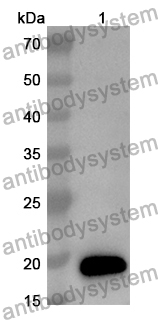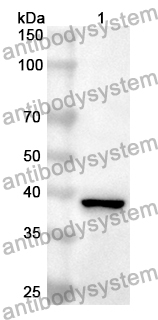Catalog No.
PMN08401
Species reactivity
Mouse
Host species
Rabbit
Isotype
IgG
Clonality
Polyclonal
Immunogen
E. coli - derived recombinant Mouse ZNRF3 (Lys53-Pro207).
Tested applications
ELISA: 1:4000-1:8000, IHC: 1:50-1:100, WB: 1:1000-1:4000
Target
KIAA1133, RNF203, RING-type E3 ubiquitin transferase ZNRF3, ZNRF3, RING finger protein 203, Zinc/RING finger protein 3, E3 ubiquitin-protein ligase ZNRF3
Purification
Purified by antigen affinity column.
Accession
Q5SSZ7
Applications
ELISA, IHC, WB
Form
Liquid
Storage buffer
0.01M PBS, pH 7.4, 50% Glycerol, 0.05% Proclin 300.
Stability and Storage
Use a manual defrost freezer and avoid repeated freeze thaw cycles. Store at 2 to 8°C for frequent use. Store at -20 to -80°C for twelve months from the date of receipt.
Structure-Guided Development of Chemically Tailored Peptide Binders of RNF43/ZNRF3 to Enable Versatile Design of Membrane Protein-Targeting PROTACs., PMID:40000409
Coactivation of Tie2 and Wnt signaling using an antibody-R-spondin fusion potentiates therapeutic angiogenesis and vessel stabilization in hindlimb ischemia., PMID:39607038
Get your receptors in a knot with new Wnt signaling agonists., PMID:38906109
Targeted protein degradation systems to enhance Wnt signaling., PMID:38847394
Potent and selective binders of the E3 ubiquitin ligase ZNRF3 stimulate Wnt signaling and intestinal organoid growth., PMID:38056465
Antibody targeting of E3 ubiquitin ligases for receptor degradation., PMID:36131013
Roadmap for Optimizing and Broadening Antibody-Based PROTACs for Degradation of Cell Surface Proteins., PMID:35481357
Longitudinal change of genetic variations in cetuximab-treated metastatic colorectal cancer., PMID:34315006
Unlike LGR4, LGR5 potentiates Wnt-β-catenin signaling without sequestering E3 ligases., PMID:33262293
Surrogate R-spondins for tissue-specific potentiation of Wnt Signaling., PMID:31914456
Anti-LRP5/6 VHHs promote differentiation of Wnt-hypersensitive intestinal stem cells., PMID:30664649
Whole exome sequencing to identify genetic markers for trastuzumab-induced cardiotoxicity., PMID:29247589
Molecular genetics and targeted therapy of WNT-related human diseases (Review)., PMID:28731148


